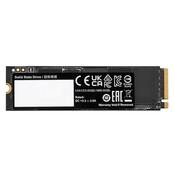Твердотельный накопитель AORUS Gen4 7300 обеспечивает скорость последовательного чтения до 7,3 ГБ/с благодаря 8-канальному контроллеру Phison E18 и 3D TLC NAND. Контроллер E18 изготовлен по 12-нм технологическому процессу, что обеспечивает достаточную вычислительную мощность. Также он поддерживает до 8 каналов NAND Flash с кэшированием 32CE, DDR4 SLC и соответствует стандарту NVMe 1.4.
Описание товара Gigabyte Накопитель SSD M.2 1TB PCIe 4.0 Aorus
Features:
Selected High Speed 3D TLC NAND Flash (1600+ MT/s)
The ultra high speed 3D TLC NAND Flash is operating at 1600+ MT/s, which is 50% more than the prevision version that leads to better performance.
Xtreme Storage Performance
By adopting Phison E18 controller and 3D TLC NAND, AORUS Gen4 7300 SSD delivers blazing speeds: up to 7,300 MB/s for sequential read, and up to 6,000MB/s sequential write. Sequential Read performance of PCIe 4.0 SSDs is 2 times faster than the PCIe 3.0 SSDs. Get ready to enter the next generation of computing with faster and smoother, gaming, streaming, and graphics intensive rendering.
Optimized Aluminum Heat Spreaders with Nanocarbon Coating for 20% Cooler
Challenged passive cooling to maximize surface area for heat dissipation with advanced thermal technology Nanocarbon coating. Applied with dual side high conductivity thermal pad ensures the heat transferring to the heatsink. The 7mm height heatsink is compatible with all the M.2 slots including the one under graphic card.
Efficient Heat Spreader Design
Compared with regular heat spreader, the new high efficient heat spreader improves thermal dissipation to extend 46% more time running at high speed. In addition, compared to the one without heatsink, AORUS Gen4 7300 SSD running 5 times longer at 7.3GB/s. Enjoy the smoother & upgraded storage performance.
Why is keeping an SSDs at lower temperatures so important?
Higher working temperature may cause data loss. The degradation factor of data loss could be a hundred times higher. With Heat Spreaders, the AORUS Gen4 7300 SSD can operate at lower working temperatures to improve data storage reliability. Furthermore, SSDs can running at extreme performance longer.

 Накопитель SSD Kingston M.2 500GB PCIe 4.0 Fury Renegade + радиатор Накопитель SSD Kingston M.2 500GB PCIe 4.0 Fury Renegade + радиатор
Накопитель SSD Kingston M.2 500GB PCIe 4.0 Fury Renegade + радиатор Накопитель SSD Kingston M.2 500GB PCIe 4.0 Fury Renegade + радиатор












